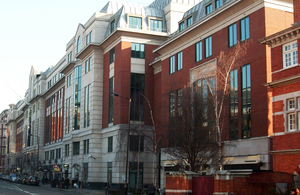Government announces updated coastguard reforms
Modernisation proposals announced for coastguard stations.

Coastguard stations will be better coordinated and more resilient to the challenges of the coming decades under updated modernisation proposals announced today (14 July 2011) by Transport Secretary Philip Hammond.
The coastguard has been helping to manage our seas and protect those who use them for over two centuries. However, the service has undergone few changes over the past forty years and is now in need of modernisation as the current structure is not sufficiently resilient and fluctuating workloads cannot be properly distributed. The government launched a consultation in December 2010 on modernisation proposals designed to address these issues and provide enhanced career opportunities for coastguard officers.
There were a total of over 1,800 responses to the consultation and while these reflected a general acceptance that change and modernisation is necessary, they also expressed concerns over a potential loss of local knowledge and a perceived weakening of operational relationships. The government’s updated proposals reflect these responses and propose creating a nationally networked system of coastguard stations comprising:
- 1 maritime operations centre in the Southampton/Portsmouth area with a back-up facility at the existing Dover site which will be retained as a 24 hour centre
- 8 sub-centres, all operated on a 24 hour basis, located at Falmouth, Milford Haven, Holyhead, Belfast, Stornoway, Shetland, Aberdeen and Humber. The small station at London is also retained.
Previously the government had proposed establishing 2 maritime operations centres (in the Southampton/Portsmouth area and Aberdeen) and 5 sub-centres, operating in daylight hours only, as well as retaining the 24 hour centre at Dover which oversees English Channel activity.
Transport Secretary Philip Hammond said:
We have been clear that modernisation is required to deliver a resilient coastguard service, fit for the 21st century. But we have always been open to debate about how that should be achieved. This has been a genuine consultation that has seen a high level of engagement and many well-thought out responses - including specific alternative proposals. It is clear from the responses that there is huge public and political admiration for the work of our coastguard, a clear consensus that change and modernisation is necessary, but also some specific concerns about the original proposals.
Our updated proposals will ensure the safety of seafarers and coastal communities, delivering the modernised and more cost-effective service we need for the 21st century, while also responding to the concerns raised during the consultation process.
Under existing arrangements, neighbouring stations are ‘paired’, allowing them to provide back-up to one another when needed. Today’s announcement means that one station in each pair is retained.
Under today’s proposals the coastguard stations at Clyde, Forth, Portland, Liverpool, Yarmouth, Brixham, Thames and Swansea would close progressively over the period 2012 to 2014/15. The station at Solent will be replaced by a new maritime operations centre in the Portsmouth/Southampton area.
There will now be the opportunity for people to comment on those elements of today’s announcement which differ from the original proposals. These will be the subject of a further period of consultation, which will run for twelve weeks ending on 6 October 2011.
Further information
Detail of today decisions
In detail, the government has concluded:
- that it is right to continue with proposals for a nationally networked system with the introduction of 1 maritime operations centre (MOC) capable of managing incidents anywhere and ensuring optimum distribution of workload across the system
- that establishing 1 MOC, rather than the 2 previously proposed, allows us to address concerns over local knowledge and the robustness of the future concept of operations by retaining one of each of the current ‘paired’ stations with the retained centres operating as part of the nationally networked system 24 hours a day rather than during daytime only - staff in each of the current ‘pair’ of stations are already familiar with, and frequently exercise, taking calls and managing incidents in an adjacent area
- that the Northern Ireland Coastguard centre at Bangor should be retained because of the specific requirement to manage the civil contingency arrangements unique to Northern Ireland and the relationship with search and rescue partners in the Irish Republic with whom we coordinate closely in air sea rescues in the waters around Ireland
- that, in light of the decision to retain 1 station from each pair, and concerns about Welsh language communication, the Holyhead station, rather than the one at Liverpool should be retained
- that, in response to concerns expressed over the resilience of infrastructure and communication links within the Scottish Islands and with the Scottish mainland, coastguard centres in both Stornoway and Shetland should be retained
- that, in the light of a further review of the potential costs of vacating the existing sites in Swansea and Milford Haven which has shown that there are no financial reasons to favour either location, and in view of the department’s substantial levels of employment in Swansea, the coastguard centre at Milford Haven rather than the centre at Swansea should be retained
A review of all the responses to the consultation launched in December 2010 has been produced under the leadership of a Non-Executive Director of the Maritime and Coastguard Agency, involving a number of serving coastguard officers and members of the PCS union. This has been placed in the Library of the House of Commons and can be found on the Maritime and Coastguard website.
The consultation document on the updated proposals may be found at the Maritime and Coastguard Agency website.
Maritime media enquiries
Media enquiries 0300 7777 878
Switchboard 0300 330 3000